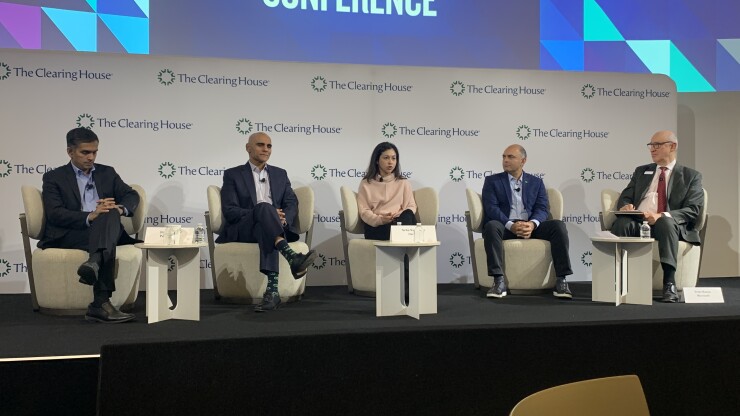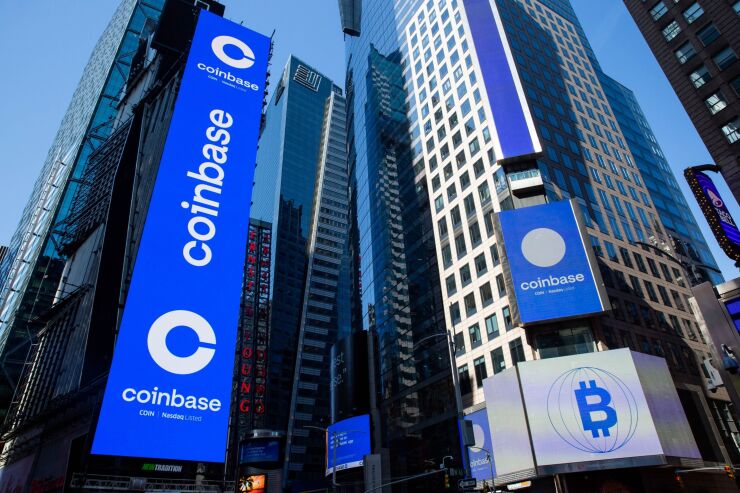
The factors impeding the growth of real-time payments include restrictions that shut out certain transactions in businesses such as real estate and shipping.
The Clearing House on Wednesday said it would boost transaction limits from $1 million to $10 million, effective Feb. 9. The FedNow rail, which went live in 2023, has a $500,000 limit. FedNow's public relations office did not respond to a request for comment.
"A lot of businesses would like to move more activity to the RTP Network, but the lower limits inhibited them," said James Colassano, senior vice president of strategy at The Clearing House. "If you have a bucket of 50 payments and only five are below $1 million, it hinders your ability to use that network."
The new RTP limit should open instant processing to more use cases, such as real estate/title insurance, merchant settlement and supply chain transactions. For example, commercial and high-value real estate payments of up to $10 million could be sent instantly at all times, enabling closings after business hours or on weekends. "Each time we have raised the limit, more use cases have come up," Colassano said, noting time-sensitive transfers from brokerage accounts to bank accounts started to flow through RTP when the limit was raised from $100,000 to $1 million in April 2022. The $10 million limit is not mandatory, and any bank that receives a $10 million real-time payment has to make that money available to its customers immediately.
"Volume growth at TCH continues to trend below same-day ACH, and FedNow seems to be gaining traction with community institutions," said Tony DeSanctis, a senior director at Cornerstone Advisors. "The hope for TCH with higher limits would be to show volume growth where unit growth isn't happening as quickly as it likes."
The RTP Network has more than 285,000 business users that access the network monthly. RTP processes about $1 billion each day, with a record $25.7 billion processed in October. On Monday, the network processed a daily record of $1.242 billion. Forty-two percent of RTP payments occur outside traditional business hours. Thirty-three percent of banks offer FedNow and another 43% plan to offer it, according to a
While real-time payments are growing in the U.S., other countries with regulatory mandates such as
In the market-driven U.S., easing some of the limits on transactions should help broaden and accelerate real-time payment adoption in the U.S., according to Elsa Tavilla, director of debit payments at Javelin Strategy & Research. "The increased RTP transaction limit also indicates growing comfort and trust in making higher value instant payments among U.S. financial institutions, businesses and consumers." —John Adams

Mastercard settles UK card fee lawsuit for $254 million
Mastercard reached an agreement in principle to settle a collective card fee lawsuit in London,
Initial reports peg the settlement at about 200 million pounds ($254.2 million), but that number could change, given the fluid nature of agreements in principle. The lawsuit was brought by Walter Merricks on behalf of 46 million U.K. adults. Originally, claimants had said damages were as much as 10 billion pounds.
The settlement marks the end of nine years of litigation between Merricks and Mastercard, Merricks said in a statement. Mastercard and Visa have been battling a slew of lawsuits over the amount they charge for card fees. The payment-processing giants in March

Ripple adds support to Swiss DeFi project
Blockchain technology firm Ripple has joined Tenity, a Switzerland-based decentralized finance incubator, in an initiative that provides mentoring, education and access to startup investors.
Tenity — which operates development hubs in Estonia, Singapore and Switzerland — has launched a fund to back emerging companies that use Ripple's XRP ledger to build digital financial services.
The fund, called Tenity Inc. Fund II, will supply startups with seed funding, support and networking. UBS, SIX Group, Julius Baer and Generali's House of InsurTech Switzerland are the initial investors in the fund, with Ripple serving as a partner.
Ripple has used blockchain to enable cross-border payments without requiring correspondent banks to manage compliance and currency exchange.

Coinbase enables Apple Pay for crypto
The cryptocurrency exchange Coinbase will support Apple Pay for third-party apps, enabling users to buy crypto from iOS devices.
Coinbase is attempting to make it easier to use Coinbase Onramp, which transfers traditional currency into crypto. The crypto exchange contends this process is complicated, often using several applications and fragmented authentication.
Other payment companies, including

Banks, fintechs, US card networks build 'digital passport' in UK
More than 70 companies and organizations are working on a shared identity in an effort to combat fraud and streamline compliance costs as digital crime increases.
Visa, Mastercard, Lloyds, HSBC, Barclays, Monzo, Revolut and Santander are among the participants in the project, which also has the backing of U.K. banking and payments regulators.
The U.K.'s Centre for Finance and Innovation Technology, a public/private organization, is managing the work.
The digital ID would work similar to a passport, with the potential benefits including shorter times to vet users and transactions.
The idea of a digital ID, which is also called a federated ID, has
CFIT, which will announce the digital ID's structure, is working as the digital security threat accelerates. E-commerce fraud passed $3 billion in the U.K. in 2023, more than double from the prior year, according to

Visa, France's postal bank issue 'green card'
La Banque Postale, the financial services subsidiary of the national post office, has launched what it's calling an impact card, with incentives used to finance sustainable projects.
Developed in collaboration with WWF France, the Visa-branded card will direct deposits toward loans that the postal bank makes to finance renovations that make homes more energy-efficient. Other funds will go toward financing nongovernment organizations that conduct biodiversity projects.
The card, which is made out of sustainable materials, has standard fees as well as an annual charge that is donated to the WWF France.
More

Commonwealth Bank of Australia logs 50% reduction in scam losses with AI
The Commonwealth Bank of Australia recently outlined how its deployment of generative artificial intelligence is fighting fraud.
The bank said in a strategic update that AI helped deliver a 50% reduction in customer scam losses when compared with last year, largely due to additional safety and security features that lean on AI. These features include NameCheck, which verifies account information of first-time payments; CallerCheck, which helps identify calls that attempt to spoof the bank; and CustomerCheck, which guards against in-person impersonations at CBA branches.
CBA also logged a 30% drop in customer-reported frauds from generative AI-powered suspicious transaction alerts, and a 40% drop in call center wait times.
The bank has been putting an increased focus on gen AI use cases in payments over the past year. In June, it teamed up with JPMorgan Chase to

Norway to join Europe's instant payment service in 2028
Norway has agreed to join the Eurosystem's TARGET Instant Payment Settlement service, with rollout planned for the first half of 2028, according to the European Central Bank.
The addition of the Norwegian krone marks the fourth currency available for instant settlement on TIPS, along with the euro, the Swedish krona and the Danish krone. The latter two
Norway is also the first non-European Union country of the European Economic Area to join one of the Eurosystem's TARGET services, ECB President Christine Lagarde said in a statement. —Joey Pizzolato





